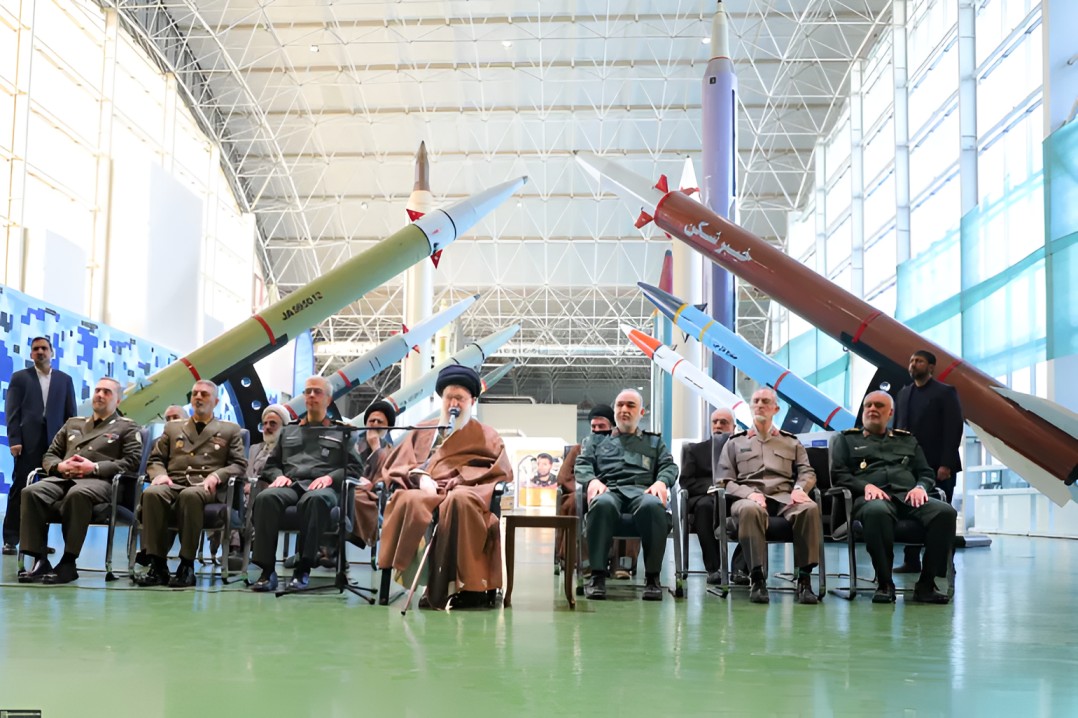Iran announced early Wednesday that it had launched hypersonic missiles in Israel amid an intensifying series of overnight attacks between the long-time rivals.
The claim came shortly after U.S. President Donald Trump publicly demanded that Iran surrender without conditions.
Though Trump maintains that the United States is not directly involved in Israel's ongoing offensive, he issued a stark warning to Tehran, saying his patience is running thin as the conflict stretches into its sixth day.
In the early hours of Wednesday, Israeli jets carried out strikes on the Iranian capital, with warnings posted on social media urging civilians in Tehran’s District 18 to evacuate.
Iranian state outlets confirmed explosions were heard in areas including Piroozi, Sabalan, and Sayyad.
In a swift response, Iranian authorities warned Tel Aviv residents to brace for attacks.
The Islamic Revolutionary Guard Corps (IRGC) claimed responsibility for launching its advanced Fattah-1 hypersonic missiles, stating that they had "repeatedly rocked shelters" in the Israeli economic centre.
“This marks the 11th wave of the honorable Operation Honest Promise 3, utilizing Fattah-1 hypersonic missiles,” the IRGC announced via state television.
Hypersonic weapons, which can travel at speeds exceeding Mach 5 and perform evasive maneuvers mid-flight, are particularly challenging to detect and intercept, raising the stakes in the conflict.
Alongside the missile strikes, Iran reportedly deployed a swarm of drones toward Israeli territory. The Israeli military confirmed that two were intercepted over the Dead Sea region.
Global powers are racing to prevent the flare-up from escalating into a full-scale regional war.
In urgent diplomatic efforts, Egyptian Foreign Minister Badr Abdelatty held separate calls Tuesday night with his Iranian counterpart and U.S. envoy Steve Witkoff, pushing for a peaceful resolution.
Meanwhile, Trump stirred international speculation by abruptly leaving the G7 summit in Canada, where world leaders had issued a collective call for an immediate ceasefire.
Upon returning to Washington, Trump intensified rhetoric against Iran, demanding its “unconditional surrender” and hinting at the U.S. military's reach.
“We know exactly where Iran’s so-called ‘Supreme Leader’ is hiding. He's an easy target, though we’re not taking action yet” Trump posted on his Truth Social platform, suggesting the U.S. could assassinate him if provoked.
He convened a meeting of the National Security Council to discuss the situation, which concluded after over an hour without a public briefing.
Despite his repeated pledges to avoid getting dragged into protracted Middle Eastern conflicts, Trump has authorized the deployment of the USS Nimitz carrier group and accompanying aircraft to the region.
While officials confirm that no final decision on direct military involvement has been made, the developments mark a dramatic escalation with global implications.
Global concerns have done little to slow the escalating conflict between Iran and Israel, as both sides continue to exchange long-range attacks that erupted last Friday when Israel launched a sweeping bombardment of Iranian nuclear and military targets.
Israel claims to have eliminated two top Iranian military figures, General Ali Shadmani and his predecessor, Gholam Ali Rashid in the course of its operations.
Since then, civilian neighborhoods in both nations have been caught in the crossfire, prompting foreign governments to initiate emergency evacuations.
According to official figures, more than 700 foreign nationals living in Iran have crossed into neighboring Armenia and Azerbaijan.
Those evacuated include citizens from Russia, Belarus, Kazakhstan, Kyrgyzstan, Tajikistan, and Uzbekistan, along with individuals from the United States, Germany, Spain, Italy, Romania, Portugal, the UAE, China, Vietnam, and Serbia.
Amid rising tensions, the U.S. has announced the temporary closure of its embassy in Jerusalem until at least Friday.
However, Washington has yet to outline any evacuation measures for Americans in the affected zones.
Fearful of further attacks, many residents of Tehran have fled the city. On Tuesday, long lines formed at petrol stations and bakeries as citizens scrambled to stockpile essentials.
Meanwhile, a major cyberattacks disabled Sepah Bank one of Iran's largest state-owned banks according to reports from Fars News Agency.
In Tel Aviv, where air raid sirens now wail regularly, some residents have sought refuge underground. A number have taken shelter in parking garages beneath shopping centres.
“We’ve decided to stay here for the foreseeable future, at least until it feels safe again,” said Mali Papirany, 30, speaking to AFP from one such underground shelter.
After years of hostility and a drawn-out covert conflict, Israel has justified its recent surprise aerial assault as a preemptive move to stop Iran from developing nuclear weapons an accusation Tehran continues to reject.
On Tuesday, Iranian outlets reported a series of blasts in the city of Isfahan, which hosts critical nuclear infrastructure.
The International Atomic Energy Agency (IAEA) confirmed that Iran’s Natanz enrichment facility sustained what appeared to be “direct impacts” on its underground centrifuge halls.
While Israel has never officially confirmed possessing nuclear weapons, the Stockholm International Peace Research Institute (SIPRI) estimates it holds around 90 nuclear warheads.
Israel maintains a long-standing policy of deliberate ambiguity about its nuclear capabilities.
The latest hostilities have disrupted ongoing diplomatic efforts aimed at reviving nuclear negotiations between Iran and the United States.
Iranian officials declared that talks with Washington would not resume while under military assault.
French President Emmanuel Macron remarked that Trump could be instrumental in reviving diplomacy with Tehran, cautioning that any attempt to topple Iran’s government could lead to regional upheaval. Meanwhile, Beijing accused Trump of exacerbating the crisis, and Turkish President Recep Tayyip Erdoğan described Israeli Prime Minister Benjamin Netanyahu as "the region’s greatest threat to peace."
Casualties continue to mount on both sides. Israeli authorities report that at least 24 of their citizens have died and hundreds more have been injured since the strikes began last Friday.
Iran, in turn, stated on Sunday that 224 people had died in Israeli attacks among them high-ranking military personnel, nuclear experts, and civilians. An updated toll has yet to be released.

